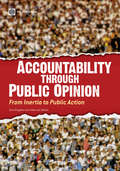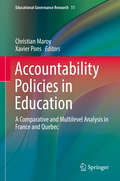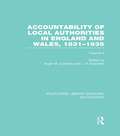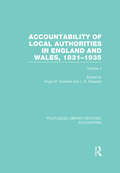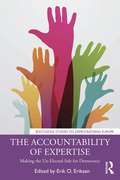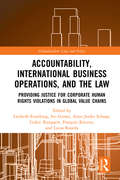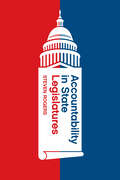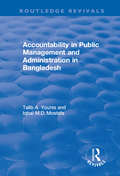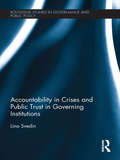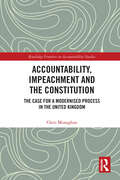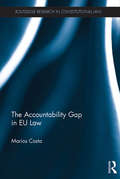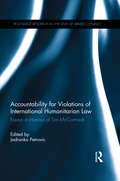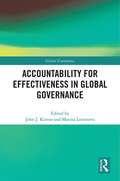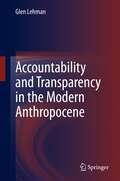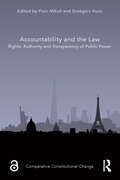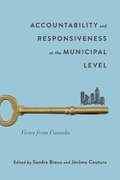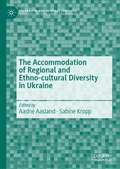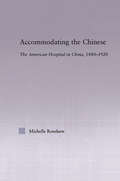- Table View
- List View
Accountable
by Tavis Smiley Stephanie RobinsonAccountable provides real-life examples of how crucial issues -- including health care, education, the economy, unequal justice, and the environment -- manifest themselves in our communities. The book demonstrates the urgent need to hold politicians and ourselves responsible, because the stakes have never been higher. Accountable examines present-day conditions and the consequences for America. At its core, this book is a tool with which the community can evaluate the successes or failures of its political leaders and of itself. This insightful book acknowledges the mistakes of the past while offering hope and inspiration for a better future.
Accountability through Public Opinion
by Sina Odugbemi Taeku Lee"Accountability" has become a buzzword in international development. Development actors appear to delight in announcing their intention to "promote accountability"-but it is often unclear what accountability is and how it can be promoted. This book addresses some questions that are crucial to understanding accountability and for understanding why accountability is important to improve the effectiveness of development aid. We ask: What does it mean to make governments accountable to their citizens? How do you do that? How do you create genuine demand for accountability among citizens, how do you move citizens from inertia to public action? The main argument of this book is that accountability is a matter of public opinion. Governments will only be accountable if there are incentives for them to do so-and only an active and critical public will change the incentives of government officials to make them responsive to citizens' demands. Accountability without public opinion is a technocratic, but not an effective solution. In this book, more than 30 accountability practitioners and thinkers discuss the concept and its structural conditions; the relationship between accountability, information, and the media; the role of deliberation to promote accountability; and mechanisms and tools to mobilize public opinion. A number of case studies from around the world illustrate the main argument of the book: Public opinion matters and an active and critical public is the surest means to achieve accountability that will benefit the citizens in developing countries. This book is designed for policy-makers and governance specialists working within the international development community, national governments, grassroots organizations, activists, and scholars engaged in understanding the interaction between accountability and public opinion and their role for increasing the impact of international development interventions.
Accountability Reconsidered: Voters, Interests, and Information in US Policymaking
by Charles M. Cameron Brandice Canes-Wrone Sanford C. Gordon Gregory A. HuberThe last two decades have witnessed a substantial change in the media environment, growing polarization of the two dominant parties, and increasing inequality of wealth and income. These profound changes necessitate updating our understanding of political accountability. Accountability Reconsidered examines how political accountability functions in the US today given the dramatic changes in voting behavior, media, congressional dynamics, and relations between branches. With particular attention to policymaking, this volume uses original research to analyze micro-foundations of voter behavior, examining its implications for incentives and offering insight into the accountability relationships among voters, interest groups, legislators, and government bureaucracy. Combining contributions from leading experts who write about the political system synoptically with those who focus on specific elements, Accountability Reconsidered brings together distinct perspectives to focus on the effect of the informational environment on government officials, bridging up-to-date knowledge about accountability mechanisms with our overall understanding of political accountability.
Accountability Policies in Education: A Comparative and Multilevel Analysis in France and Quebec (Educational Governance Research #11)
by Christian Maroy Xavier PonsThis book addresses current changes of education policies in a context of globalisation. It does so by focusing on the implementation of performance-based accountability policies in France and in Quebec (Canada). It questions the trajectory of these policies, their mediations and their instrumentation in various territories and schools through a theoretical framework which combines a North American neo-institutionalist approach with the perspective of the French sociologie de l’action publique. The book extends the current international literature on English-speaking experiences of hard accountability to research on “soft” accountability policies and proposes a deep investigation in two highly contrasted education systems. This investigation is multilevel and has led to field research both in schools, in intermediate authorities, and in central administrations for three years. The research presented in the book addresses the international literature on accountability in public administration and in education, the current transformations of governance in education, as well as the forms taken by the globalisation of education policies in countries differently exposed to international influences. The comparison highlights a convergent neo-statist trajectory of the performance-based accountability policy in the two countries, various forms of governance by results enacted at the local and meso level, and more intense impacts of these policies on schools and teacher’s practices in Quebec than in France.
Accountability of Local Authorities in England and Wales, 1831-1935 Volume 2 (Routledge Library Editions: Accounting)
by Hugh M. Coombs J. R. EdwardsThese books make available material relating to the statutory regulations covering the degree of accountability required from local authorities during the period 1834-1936. The bulk of historical accounting research has focused on the development of financial accounting although in recent years the development of management accounting has attracted more interest. In both these areas, it has been the accounting practices of the private sector which have received more attention, central government in the Middle Ages some attention, and local government accounting very little. These volumes redress this imbalance in historical investigation, both to provide a comparative basis for work on the private sector and to provide an historical perspective for the system of local government accounting currently in use.
Accountability of Local Authorities in England and Wales, 1831-1935 Volume 1 (Routledge Library Editions: Accounting)
by Hugh M. Coombs J. R. EdwardsThese books make available material relating to the statutory regulations covering the degree of accountability required from local authorities during the period 1834-1936. The bulk of historical accounting research has focused on the development of financial accounting although in recent years the development of management accounting has attracted more interest. In both these areas, it has been the accounting practices of the private sector which have received more attention, central government in the Middle Ages some attention, and local government accounting very little. These volumes redress this imbalance in historical investigation, both to provide a comparative basis for work on the private sector and to provide an historical perspective for the system of local government accounting currently in use.
The Accountability of Expertise: Making the Un-Elected Safe for Democracy (Routledge Studies on Democratising Europe)
by Erik O. EriksenBased on in-depth studies of the relationship between expertise and democracy in Europe, this book presents a new approach to how the un-elected can be made safe for democracy. It addresses the challenge of reconciling modern governments’ need for knowledge with the demand for democratic legitimacy. Knowledge-based decision-making is indispensable to modern democracies. This book establishes a public reason model of legitimacy and clarifies the conditions under which unelected bodies can be deemed legitimate as they are called upon to handle pandemics, financial crises, climate change and migration flows. Expert bodies are seeking neither re-election nor popularity, they can speak truth to power as well as to the citizenry at large. They are unelected, yet they wield power. How could they possibly be legitimate? This book is of key interest to scholars and students of democracy, governance, and more broadly to political and administrative science as well as the Science Technology Studies (STS).
Accountability, International Business Operations and the Law: Providing Justice for Corporate Human Rights Violations in Global Value Chains (Globalization: Law and Policy)
by Liesbeth Enneking Ivo Giesen Anne-Jetske Schaap Cedric Ryngaert François Kristen Lucas RoordaA consensus has emerged that corporations have societal and environmental responsibilities when operating transnationally. However, how exactly corporations can be held legally accountable for their transgressions, if at all, is less clear. This volume inquires how regulatory tools stemming from international law, public law, and private law may or may not be used for transnational corporate accountability purposes. Attention is devoted to applicable standards of liability, institutional and jurisdictional issues, and practical challenges, with a focus on ways to improve the existing legal status quo. In addition, there is consideration of the extent to which non-legal regulatory instruments may complement or provide more viable alternatives to these legal mechanisms. The book combines legaldoctrinal approaches with comparative, interdisciplinary, and policy insights with the dual aim of furthering the legal scholarly debate on these issues and enabling higher quality decision-making by policymakers seeking to implement regulatory measures that enhance corporate accountability in this context. Through its study of contemporary developments in legislation and case law, it provides a timely and important contribution to the scholarly and sociopolitical debate in the fastevolving field of international corporate social responsibility and accountability.
Accountability in State Legislatures (Chicago Studies in American Politics)
by Steven RogersA troubling portrait of democracy in US state legislatures. State legislatures hold tremendous authority over key facets of our lives, ranging from healthcare to marriage to immigration policy. In theory, elections create incentives for state legislators to produce good policies. But do they? Drawing on wide-ranging quantitative and qualitative evidence, Steven Rogers offers the most comprehensive assessment of this question to date, testing different potential mechanisms of accountability. His findings are sobering: almost ninety percent of American voters do not know who their state legislator is; over one-third of incumbent legislators run unchallenged in both primary and general elections; and election outcomes have little relationship with legislators’ own behavior. Rogers’s analysis of state legislatures highlights the costs of our highly nationalized politics, challenging theories of democratic accountability and providing a troubling picture of democracy in the states.
Accountability in Public Policy Partnerships
by Julia SteetsA PDF version of this book is available for free in open access via the OAPEN Library platform, www. oapen. org . This book presents a new model of accountability which ensures that public-private partnerships don't erode public accountability. It defines concrete accountability standards for different types of partnerships.
Accountability in Public Management and Administration in Bangladesh
by Talib A. Younis Iqbal Md. MostafaThis title was first published in 2000: This timely volume makes a valuable contribution to our understanding of the issues faced by developing countries embarking on the path of democracy and economic development. Accountability in public management and administration is an essential element in the decision making process. It provides a comprehensive study of public institutions and their management in a developing context.
Accountability in Crises and Public Trust in Governing Institutions (Routledge Studies in Governance and Public Policy)
by Lina SvedinThis book examines how efforts to exert accountability in crises affect public trust in governing institutions. Using Sweden as the case study, this book provides a framework to analyse accountability in crises and looks at how this affects trust in government. Crises test the fabric of governing institutions. Threatening core societal values, they force elected officials and public servants to make consequential decisions under pressure and uncertainty. Public trust in governing institutions is intrinsically linked to the ability to hold decision-makers accountable for the crucial decisions they make. The book presents empirical evidence from examination of the general bases for accountability in public administration, and at the accountability mechanisms of specific administrative systems, before focusing on longer term policy changes. The author finds that within the complex web of bureaucratic and political moves democratic processes have been undermined across time contributing to misplaced and declining trust in governing institutions. Accountability in Crises and Public Trust in Governing Institutions will be of interest to students, scholars and practitioners of public policy, political leadership and governance.
Accountability, Impeachment and the Constitution: The Case for a Modernised Process in the United Kingdom (Routledge Frontiers in Accountability Studies)
by Chris MonaghanThis book sets out and explores the case for a modernised impeachment process for the United Kingdom. The work examines the present law and history of impeachment in the United Kingdom, which today is widely regarded as having fallen into desuetude and its procedures inappropriate for modern conditions. It discusses how impeachment operates in two countries, the United States and Denmark, selected respectively for their marked differences from and similarities to the United Kingdom’s political and constitutional system, for the purposes of illumination and possible lessons for a new impeachment process. The book seeks to provide a balanced and independent examination of the case for this, concluding that it would have a valuable role to play in the future development of the United Kingdom’s system of politics and government. It concludes by setting out a detailed model for the structure, working and effect of impeachment. The book will be of interest to students, academics and policy-makers working in the areas of constitutional law and politics.
The Accountability Gap in EU law: Mind the Gap (Routledge Research in Constitutional Law)
by Marios CostaAlmost two decades ago, the fall of the Santer Commission against a background of allegations of maladministration and nepotism had the effect of placing accountability on the political agenda of the EU institutions. More recently, the non-ratification of the Constitutional Treaty, the difficulties of the ratification of the Lisbon Treaty and the current financial crisis have increased the calls for accountability in the EU. This book investigates whether any progress towards more accountability and transparency has been made in the post-Lisbon era by taking a holistic approach to the subject. Marios Costa argues that currently the EU institutions and the Member States are not in a position to hold the so-called independent agencies as well as the various committees and expert groups accountable. Despite recent progress, the EU still needs to put forward an acceptable constitutional framework which will truly secure accountability at the EU level of governance.
Accountability for Violations of International Humanitarian Law: Essays in Honour of Tim McCormack (Routledge Research in the Law of Armed Conflict)
by Jadranka PetrovicInternational criminal adjudication, together with the prosecution and appropriate punishment of offenders at a national level, remains the most effective means of enforcing International Humanitarian Law. This book considers the various issues emanating from present-day breaches of norms of International Humanitarian Law (IHL) and the question of how impunity for such breaches can be tackled. Honouring the work of Timothy McCormack, Professor of International Law at the University of Melbourne and a world renowned expert on IHL and International Criminal Law, contributors of the book explore the interplay between the rules governing accountability for violations of IHL and other areas of law that impact the prosecution of war crimes, including international criminal law, human rights law, arms control law, constitutional law and national criminal law. In providing a contemporary consideration of the various issues emerging from present-day breaches of norms of IHL, especially in light of growing interest in ‘fragmentation’ and ‘normative pluralism’, this book will be of great use and interest to students and researchers in public international law, international law, and conflict studies.
Accountability for Effectiveness in Global Governance (Global Governance)
by John Kirton Marina LarionovaThe global community confronts a comprehensive and interconnected array of compelling economic, development and security challenges which require effective global governance. At the centre of world governance stand the new plurilateral summit institutions; the G8 and G20, and UN summits on subjects such as sustainable development and climate change. Many observers and participants regard the performance of these summits as inadequate and doubt their ability to cope with increasingly complex and numerous global challenges. This book critically examines how effectively central global institutions comply with their commitments and how their effectiveness can be improved through accountability measures designed to raise compliance and deliver better results. Expert contributors assess compliance and accountability at the key global institutions to provide an important resource for policymakers and scholars in political science, governance and accountability. For additional information and data relating to the book, please visit: http://www.g7g20.utoronto.ca/accountability/
Accountability for After-School Care
by Alison Jacknowitz Angela Hawken Megan K. BeckettIncreasing numbers of children are participating in after-school programs, and with more federal and state funding the number of such programs is likely to grow. This growth has been occurring, however, with little guidance as to what program features or practices might be most helpful in nurturing the educational achievement, emotional development, and health of the children involved. This book helps fill that need for guidance by offering a set of 18 model practices against which after-school programs can be evaluated. The authors provide ways to score adherence to the criteria, from excellent to inadequate; survey forms for collecting the information to assign these grades; and an illustrative application of their approach to a set of real-world after-school programs.
Accountability and Transparency in the Modern Anthropocene
by Glen LehmanThe book is about accountability processes and how they contribute solutions to our current environmental and global political problems. This book is different to other literature in this field. This is so because the dominant accountability discourse is shaped by what is defined as a neoliberal business case for social and environmental reform. This book assumes a nirvana stance within globalisation where all citizens operate within the parameters of the free market and will recover from adverse economic and political damage. Further this book uses neoliberalism and free-market reforms aims as examples to implement efficient management technologies and create more competitive pressures. Central to the argument of the book are perspectives on authenticity, expressivism and interpretivism which are found to provide a radical reworking of our understanding of being in the world. These frameworks offer a starting point for rethinking the way individuals, businesses and communities ought to be dealing politically with accountability and ecological crises. The argument builds to an accountability perspective that utilises work from expressivism, interpretivism, classical liberalism and postmodern theory. The theoretical quest undertaken in this book is to develop connections between accountability, democratic, ethical and ecological perspectives.
Accountability and the Law: Rights, Authority and Transparency of Public Power (ISSN)
by Piotr Mikuli Grzegorz KucaThis book discusses contemporary accountability and transparency mechanisms by presenting a selection of case studies.The authors deal with various problems connected to controlling public institutions and incumbents’ responsibility in state bodies. The work is divided into three parts. Part I: Law examines the institutional and objective approach. Part II: Fairness and Rights considers the subject approach, referring to a recipient of rights. Part III: Authority looks at the functional approach, referring to the executors of law. Providing insights into increasing understanding of various concepts, principles, and institutions characteristic of the modern state, the book makes a valuable contribution to the area of comparative constitutional change.It will be a valuable resource for academics, researchers, and policy-makers working in the areas of constitutional law and politics.
Accountability and the Law: Rights, Authority and Transparency of Public Power (Comparative Constitutional Change)
by Piotr Mikuli; Grzegorz KucaThis book discusses contemporary accountability and transparency mechanisms by presenting a selection of case studies. The authors deal with various problems connected to controlling public institutions and incumbents’ responsibility in state bodies. The work is divided into three parts. Part I: Law examines the institutional and objective approach. Part II: Fairness and Rights considers the subject approach, referring to a recipient of rights. Part III: Authority looks at the functional approach, referring to the executors of law. Providing insights into increasing understanding of various concepts, principles, and institutions characteristic of the modern state, the book makes a valuable contribution to the area of comparative constitutional change. It will be a valuable resource for academics, researchers, and policy-makers working in the areas of constitutional law and politics.
Accountability and Responsiveness at the Municipal Level: Views from Canada (McGill-Queen's Studies in Urban Governance #9)
by Sandra Breux Jérôme CoutureIn Canada, the quality of municipal democracy has been questioned due to three crucial factors. First, voter turnout tends to be significantly lower for municipal elections than it is for other levels of government. Second, the re-election rate of incumbent candidates is higher compared to provincial, territorial, and federal elections. Third, corruption and other scandals have tarnished the image of local democracy. Are cities sufficiently capable of responding to crises and representing the interests of their residents? Accountability and Responsiveness at the Municipal Level addresses these issues through qualitative and quantitative analysis, focusing on some of the most important characteristics of the Canadian municipal scene, including the contexts of partisanship and non-partisanship, the careers and daily work of municipal officials, and multilevel governance. This volume also assists directly in the collection and dissemination of data about cities as there is currently no centralized system for capturing and organizing electoral statistics at the municipal level. Municipal democracy in Canada suffers from a representation deficit. Accountability and Responsiveness at the Municipal Level is an important first step in building high-quality comparative information on the politics of Canada’s cities.
Accountability and Regulatory Governance
by Andrea C. Bianculli Xavier Fern�ndez-i-Mar�n Jacint JordanaThis collection improves our understanding of the problems associated to accountability in regulatory governance, focusing on audiences, controls and responsibilities in the politics of regulation and through a systematic exploration of the various mechanisms through which accountability in regulatory governance
Accompanying: Pathways to Social Change
by Staughton LyndTo better understand the impact of social movements in recent years, this analysis distinguishes strategies of social change into two parts: organizing, which is characteristic of the 1960s movement in the United States, and accompaniment, which was articulated by Archbishop Óscar Romero of El Salvador. Both are valuable tools for understanding and promoting social movements; in accompaniment, the promoter of social change and his or her oppressed colleague view themselves as two experts, each bringing indispensable experience to a shared project. Together, as equals, they seek to create what the Zapatistas call "another world." The author applies the distinction between accompaniment and organizing to five social movements in which he has taken part: the labor and civil rights movements, the antiwar movement, prisoner insurgencies, and the movement sparked by Occupy Wall Street. Also included are the experiences of the author's wife Alice Lynd, a partner in these efforts, who has been a draft counselor and advocate for prisoners in maximum-security confinement.
The Accommodation of Regional and Ethno-cultural Diversity in Ukraine (Federalism and Internal Conflicts)
by Aadne Aasland Sabine KroppThe book offers new insights into how ethnicity, language and regional-local identity interact within the context of Ukrainian political reform, and indicates how these reforms affect social cohesion among ethno-cultural groups. While the individual chapters each focus on one or a few facets of the overall research question, together they draw a nuanced picture of the multifaceted challenges to creating and consolidating social cohesion in a nationalizing state. The concept integrates various disciplines, including political science, international relations, law, and sociology. Correspondingly, the contributions are based on various methodological approaches, ranging from legal analysis over media discourse analysis, individual and focus group interviews to analysis of data from a representative population survey. The findings of the in-depth study are discussed within the broader context of comparative research on diversity management and social cohesion in fragmented societies.
Accommodating the Chinese: The American Hospital in China, 1880-1920 (East Asia: History, Politics, Sociology and Culture)
by Michelle Campbell RenshawThis in-depth comparative study demonstrates that the hospital established in China - its planning and architecture, financing, and all aspects of day-to-day operation - differed from its counterpart at home. These differences were never due to a single, or even dominant cause. They were a result of a complex process involving accommodation, appreciation, negotiation, opportunism and pragmatism.

